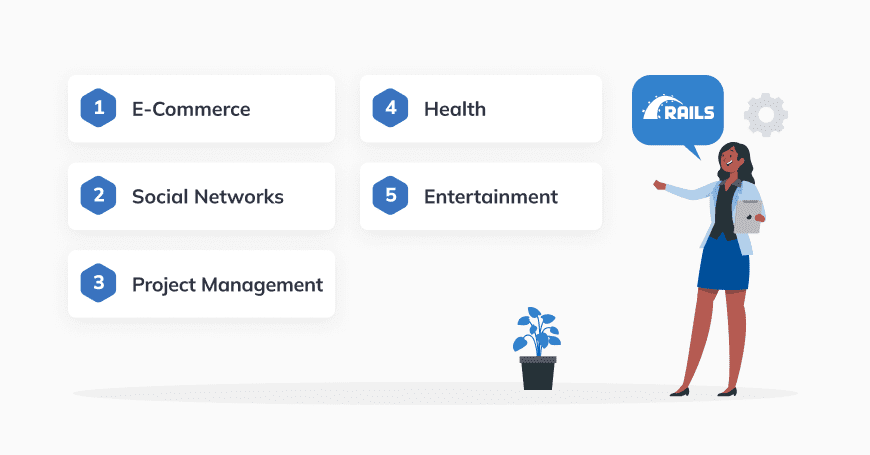
How to Hire Ruby on Rails Developers



When it comes to creating a robust and maintainable application, you can’t help but think of RoR. This framework is suitable for developing any type of web application: from standard collaboration software to large-scale ERP solutions and analytical systems. No wonder the services of specialists who know all the secrets of using the tool are so popular. Today we’ll talk about what RoR developers do, how they can add value to your project, and how you can hire them.
Content
It is a multilevel MVC framework designed for building web apps that use relational and NoSQL databases. The tool is based on the popular Ruby language, which is suitable not only for ordinary websites but also for web apps with complex business logic. In any case, it endows a product with important characteristics such as speed, fault tolerance, and the ability to handle high loads.

Working with this framework is based on three principles:
RoR developers appreciate the framework for its extensibility. The fact is that a broad ecosystem of plugins is built around it. Everyone can expand their capabilities by selecting the right gems, low-level or high-level. The former help to affect a certain aspect of the product’s inner workings. The latter are separate modules designed to solve a variety of business problems.
The presence of plugins has played an essential role in shaping the tool’s popularity on the market. It is chosen when it is necessary to create a product faster and ensure its absolute reliability. How is this possible? Speed is increased by selectively connecting libraries and plugins. Reliability is guaranteed by the fact that all plugins are well tested. And overall, the tool has a strong community that provides serious support.
Speed and reliability are probably the main reasons why this tool is picked for client-oriented projects and platforms with thousands of visitors. Let’s look at when it makes sense to hire RoR developer.

It is a great option for apps with high speed and load resistance requirements. The tool helps implement complex business logic and dynamic web interfaces and provides reliability and maintainability.
RoR is suitable for such projects:
In addition, RoR is ideal for MVP implementation. And not only because of the speed. It also provides cost-effectiveness and flexible changes. The same goes for prototyping and testing multiple versions (before developing a complete solution), as well as test updates (before deploying to the final product).
There are some projects which need MVP implementation more than others. They are aimed at attracting potential customers. Naturally, a founder is interested in demonstrating their product to the target audience as soon as possible to see if they will pay for it. The decision to hire Ruby developers, in this case, will be the right one.
However, despite the apparent advantages of the tool, there are many myths about it. For example, the developed products do not meet the claimed scalability and speed. However, the fact that these are just myths proves the experience of many companies who trusted RoR and won world fame.
In the previous paragraph, we gave examples of companies that chose this tool. This is a very small fraction of those who have appreciated the power of RoR and built successful digital solutions on it. We have prepared a list of such companies that you are definitely familiar with.
Ten well-known companies using Ruby on Rails:
It is not a complete list. Crunchbase, Ask.fm, Fab, SlideShare, SoundCloud, Zendesk, Fiverr, Diaspora, Groupon… The number of framework members is really impressive! All of them, at some point, decided to hire Ruby on Rails developer (or even a whole team), and they did not go wrong. They managed to achieve success just by working with professionals.

Let’s start by debunking another myth. Many people think there are no developers in this field. According to Statista 2021, Ruby is the 17th most used language (between Rust and Dart). What about the framework? According to the statistics for the same year, it is in the 13th position (between Laravel и Gatsby).
This can be explained by the fact that the threshold of entry into Ruby is relatively high, and therefore it is rarely chosen to start in programming. As a rule, people come to it after a few years of working with other languages and often from the PHP world (ranked #11 in TOP). As you can see, there are developers. And best of all – they all have a lot of experience under their belt.
Take a look at the experience levels:
Among the main responsibilities of the specialist are writing code for frontend and backend and database management. They can also solve security issues, run tests, fix bugs, and create technical specifications. All of this involves working closely with other team members to achieve the common goal of completing the project on time and within the stated budget.
Skills that help with these tasks:
1. Technical:
2. Soft :
As you can see, it is crucial for someone who interacts with a team to have a whole set of personal qualities. Sometimes it is from them that the success of the project depends. For example, a developer often takes responsibility for picking the only right path. Or for eliminating misunderstandings between employees and setting up a workflow from scratch.
As a rule, it is the team that works on the project. It can be full-time employees or outsourcers explicitly allocated for your project. By the way, a single specialist can be dedicated, but they are also embedded in the team. But freelancers usually work alone. Below we will talk about all the models in more detail.

It is the traditional type of employment, familiar to everyone. It is practiced by large companies that can afford to keep a whole staff. And there are a lot of expenses: from the rental of offices to monthly payments and dues. Assembling your team, which will lead the project to success, is quite an attractive idea. And it’s perfectly feasible, provided your budget is not limited.
Strengths:
Weaknesses:
If necessary, you can find a specialist with any skills on the expanse of freelance platforms. In front of you will open a huge selection of candidates from different countries who do not mind starting a job right now. However, you should be careful here. Despite the nice prices, you should not choose this model for a long-term project. You won’t be able to establish the control you want, no matter how much you want.
Strengths:
Weaknesses:
Where to look for candidates: Freelancer, Upwork (juniors and middles), Toptal (experts).
It is a more modern way of cooperation that lacks the disadvantages of the previous ones. You state your requirements, and the outsourcer selects specialists with the right skills for you. It can be a multidisciplinary team (programmers, designers, testers, analysts, etc.) or one or two RoR developers. Despite the remote format, you can coordinate the process yourself (or entrust it to an outsourcing company).
Strengths:
Weaknesses:
Where to hire dedicated Ruby on Rails developers: platforms like Clutch and GoodFirms.

It all depends on where you are going to look for a specialist. The hourly rate depends on the region. As a rule, it is cheaper to hire a European developer than an American one. Although in the case of Europe, it is not all so unambiguous: prices in the eastern part are more attractive than in the western.
According to our observations, the U.S. hourly rate ranges from $75 to $200, while in Western Europe, it is $60 to $100. In Eastern Europe, you can find a good Ruby specialist with very nice rates: $40-70 per hour. Similar prices are offered in Asia.
If you do not know which company to choose – from America or Eastern Europe, it is recommended to select the second option. And not only because of the good rates. Eastern European performers stand out clearly for both competence and responsibility, as evidenced by the positive reviews on various resources.
It is important to remember that many factors influence the rates:
Here an important question arises: how do you know if the candidate (team) has the experience mentioned on the site? Alas, even reviews on Clutch and similar platforms are not always a guarantee. We recommend that you check the performer yourself in real-time during the interview.

It is commonly thought that the interview is only for personal communication. This is not the case in the IT industry. During the interview, you can test the skills and knowledge on which the entire project’s success depends. You can do this yourself or bring in an employee who knows Ruby. Another option is to invite an outside independent expert.
Here are nine technical questions:
Of course, this is not the whole list of questions that can be asked to test the knowledge. However, it is a fundamental base. Do not limit yourself to short answers; ask for details on this or that topic. If a candidate is familiar with the language and framework, they can give detailed answers.
There are other ways to test. Before the interview, ask the candidate to send you their portfolio. Study it beforehand, and then, during the interview, clarify important points. How was the work process organized? What methods and approaches were used? What pitfalls were encountered? Another option is to prepare a test and offer to take it before you.
Now you know that hiring Ruby developers is not a problem. The main thing is to be prepared: to describe the tasks clearly, decide on the cooperation model, set a budget, and choose the region with the best prices. Then research the selected market and make a list of favorites. Consistently exclude those who do not meet all the requirements until only one candidate is left.
It’s a multi-level MVC framework based on the Ruby language. It’s ideal for creating different web apps from e-commerce, social networking, entertainment, health, and project management categories. It’s a good option for quick MVP implementation.
A specialist writes frontend and backend code, manages the database, runs tests and fixes bugs, and creates technical specifications. Senior also manages projects and makes major decisions.
Determine your requirements and outline the range of project tasks. Research the region where prices seem most attractive to you. For example, Eastern Europe. Research the market, select your favorites, and interview each one until one stands out.








